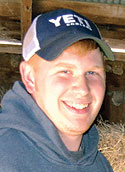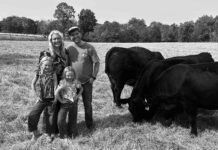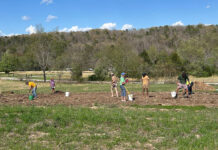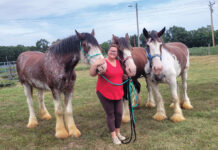
When Dalton Smith, a Rolla student at East Central Community College and his friends, Seth Morris and Lane McDonald, both students at Rolla, Mo., High School heard about the devastating wildfires that hit Oklahoma and northern Texas, they made the decision to try to help.
Dalton made the first contacts to the stricken area through Facebook connections to other agricultural groups that had donated hay available. They had hay but not enough resources or funds available to haul or ship it where it was most needed. The boys took Dalton’s new truck and drove 1,300 miles in 21 hours in two days to haul 150 bales to farmers who had lost much or all of their grass pastures, their hay and worst of all, much of their livestock.
“It turned out the people we hauled the hay to, needed the smaller bales or smaller deliveries because they only had a couple of animals or a few animals left,” Dalton explained. “We picked up the bales in Arkansas and then hauled them to Laverne, Okla., close to the Oklahoma-Texas line.”
As they traveled, the teens were surprised, passing through a number of small towns, how little others knew about the plight of their relatively close neighbors, suffering terrible losses.
“So little of this has been on the national news and people just didn’t know,” Dalton said. “We’d seen it on Facebook and agricultural websites. In this area, we have trees and other vegetation that slows down the wildfires and that makes them easier to fight. Out there, they have only grass and it burns so fast, especially with a 60 to 70 mile an hour wind added in, like they’ve been dealing with. They’ve lost hundreds of thousands of animals as two million acres have burned and six deaths have been attributed to the fires as well.”
The Missouri teens also learned some harsh lessons about the tragic side of agriculture when fighting a natural disaster.
“They told us how they would get a fire line cut and be making some headway and then a rabbit, on fire, would run from the fireside and set off another fire,” Seth added. “Many of the animals weren’t killed outright. They would be so injured, so burned but not dead, the owners and local deputies had to go along just shooting them.”
“One of the deputies told us they ran out of ammunition,” Lane added with a shake of his head.
“The total damage might not be known for more than a year,” Dalton continued. “Many of the cows that survived have suffered a lot of smoke inhalation. Their calves maybe still born next season or have birth defects as a result.”
“Some of the livestock were close enough to crop fields that they could be driven into the crops which were green and that protected them from the fires,” Lane said.
“We wanted to make certain we were there to help and not need help ourselves so we made sure we took a reliable trailer and Dalton’s newer truck, not my old farm truck,” Seth added with a chuckle. “We had spare tires for the truck and the trailer, jacks and an air compressor, too.”
In the future, Dalton would like to stay in the field of agriculture perhaps as an ag teacher someday. He is also interested in welding and heavy equipment operation.
Seth and Lane have both worked as farm hands at the local Missouri Southern Seed and cut a lot of firewood together. Seth would like to work for the National Forest Service, like his father, and Lane hopes to work in the construction trade.
The sons of Jodie and Mike Schmid, Darren and Rachel Morris, and Shaun and Bethany McDonald, the young men are not finished yet in their efforts to help their Oklahoma and Texas neighbors. They plan to make another trip southwest around their schools’ spring break.
“We’d like to take more supplies this time, fencing and animal nutritional support, like mineral and salt blocks. Hundreds of miles of fencing are gone, too. Someone here told me that the awareness we raised about the whole situation out there may mean more than the actual donations we took,” Dalton concluded. “Now that we’ve done this and the news has spread, more of our friends want to go with us this next trip so we’re hoping to take more vehicles and more supplies.”
“It’s estimated that farmers in that area may have lost up to 80 percent of their herds. This is how the agricultural community sticks together and takes care of each other. If something like this happened here in the Ozarks, I’d like to think that folks would come help us out,” Seth concluded.







